Arnold Palmer’s finest Ryder Cup moments
Both as player and captain, Arnold Palmer was an inspiration to U.S teams

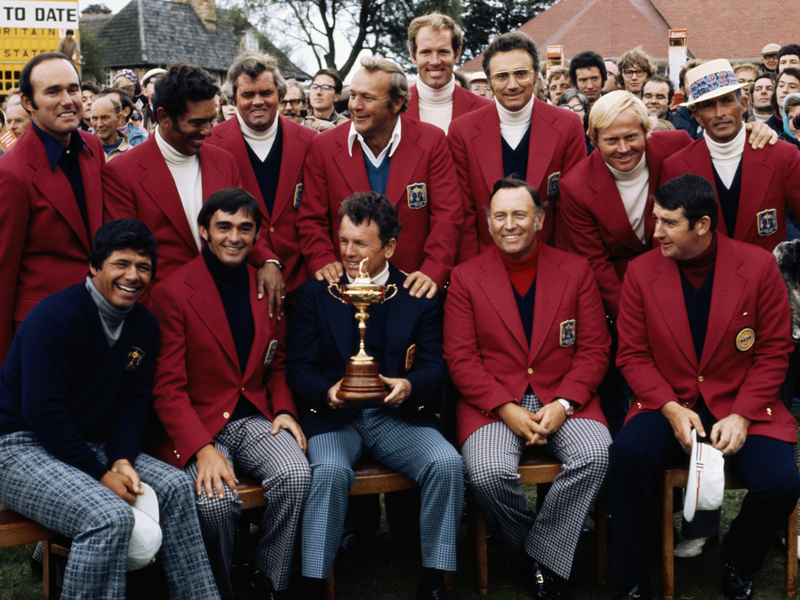
A look at some of Arnold Palmer’s most memorable Ryder Cup moments. Both as a player and a captain, “The King” was an inspiration to the U.S. team.
Arnold Palmer who died on Sunday had a tremendous record in the Ryder Cup. As a player, he won 22 of the 32 games he contested over six different matches. As a playing captain, and then a non-playing captain, he twice led his side to victory. Here we consider some of Arnold Palmer’s finest Ryder Cup moments.
1961 – An impressive debut
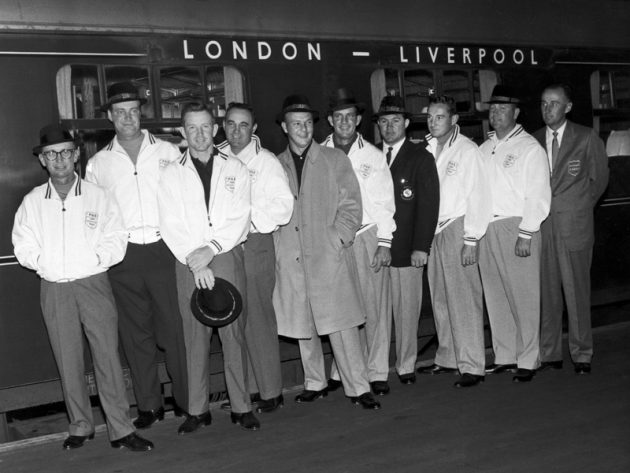
Although he’d won The Masters in 1958 and been the PGA Tour’s leading money winner that season, Palmer didn’t play in the 1959 matches at Indian Wells. He made his debut, aged 32, at Royal Lytham in October 1961. By then he was a four-time Major champion, having won The Masters again in 1960, the U.S. Open of that season and The Open at Royal Birkdale in 1961.
Palmer was no stranger then to links golf when he played his first Ryder Cup match at Lytham, paired with Billy Casper against Dai Rees and Ken Bousfield in the morning foursomes on day one. The American pair were relatively comfortable winners and they teamed up again in the afternoon to see off John Panton and Bernard Hunt by 5&4. In the second day singles, Palmer defeated Tom Haliburton and halved with Peter Alliss. On his debut, he had played all four matches and had secured 3.5 points for the USA, as they won by a total score of 14.5 to 9.5.
1963 – A captain leading from the front
In just his second Ryder Cup appearance, Palmer was playing captain at East Lake in Georgia. Arnie was suffering from a nagging shoulder injury in the build-up to the 1963 matches, but he played through the pain and inspired his team to a mammoth 23-9 victory.
Subscribe to the Golf Monthly newsletter to stay up to date with all the latest tour news, equipment news, reviews, head-to-heads and buyer’s guides from our team of experienced experts.
There’d been a change in format for the 1963 matches with an extra day added, meaning eight extra points were available. Palmer played in all six games (two a day for three straight days, with an injured shoulder) and won four of them. His contribution as a player was great but he showed himself to be a great leader and his team members backed him fully.
“Our team was one of the best,” Palmer said. “They co-operated fully. If they felt they weren’t playing their best they asked to sit out and I appreciated that honesty.”
Golf Monthly podcast, Ryder Cup preview:
1965 – Resilience at Royal Birkdale
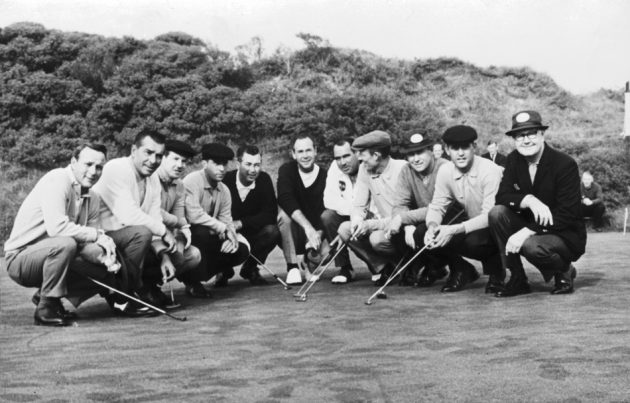
In the first foursomes at Royal Birkdale in 1965, Arnold Palmer and Dave Marr looked all at sea against Dave Thomas and George Will. A rookie in '65, Marr admitted to being nervous and he and Arnie never got going in the match. That combined with some good play from the British pair saw Palmer and Marr slammed by 6&5.
But rather than dwelling on defeat, the Americans skipped lunch to go and practice: determined to fight back in the afternoon foursomes. They were paired up again and would once again take on Thomas and Will.
This time, the nerves were gone as the US pairing sought revenge. They raced to the turn in just 30 strokes. In only 13 holes, Palmer and Marr were seven-under and they turned the 6&5 defeat of the morning on its head, dispatching Thomas and Will by the same margin.
Once again in 1965, Palmer played all six matches and, as in 1963, he won four points, including both singles on the final day.
1967 – Dominance at the Champions Golf Club
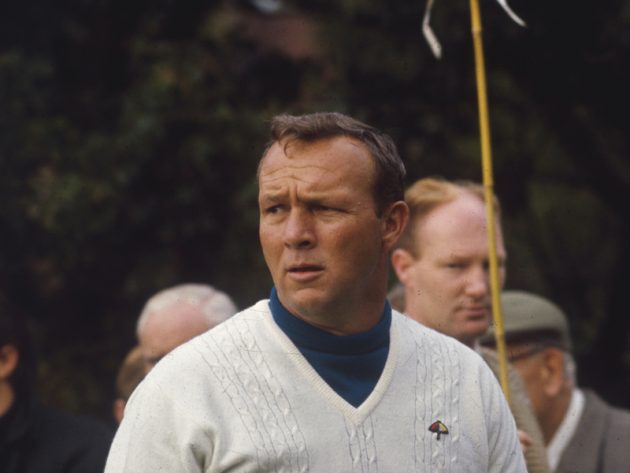
Palmer played superbly in the 1967 matches at the Champions Golf Club in Texas. He won five points from the five matches he played in, including resounding wins over Tony Jacklin and Brian Huggett in the final day singles contests.
1973 – He’s still got it.
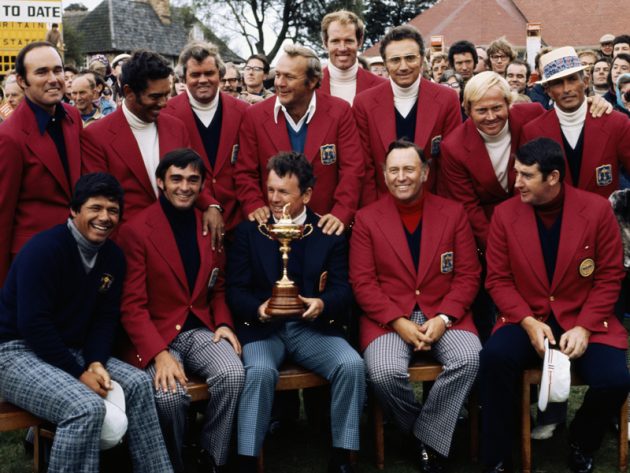
Palmer was 44 when he played his last Ryder Cup at Muirfield in 1973. But if there were suggestions he was past his best before the contest, those were quickly dispelled by the first morning foursomes.
Paired with Jack Nicklaus, both men played superbly against Maurice Bembridge and Eddie Polland. The Americans went ahead early and consolidated their lead with two incredible wood shots to the 558 yard 5th that set up an eagle three. They eventually won by 6&5 and put a crucial point on the board for the visitors. The first two matches of the session had gone to GB&I and the third had been halved. The USA eventually won the match by 19 to 13.
1975 – Captain Fantastic at home in Pennsylvania
In 1975, Palmer was non-playing captain at Laurel Valley in Pennsylvania, just a short drive from his home.
“I have achieved many honours in golf, but this one tops them all, especially since we are playing the matches at Laurel Valley which has been a second home to me,” he had said.
Palmer was in charge of a superb team including: Nicklaus, Irwin, Miller, Trevino and Weiskopf and he guided them to a convincing win – 21 points to 11.
In total, Arnold Palmer was involved in seven Ryder Cups, 6 playing and 1 as non-playing captain. The USA won all seven of those matches. The only one in the 1960s that Palmer missed was in 1969 when the contest was halved.
Palmer won a total of 23 points for the USA, only Billy Casper with 23.5 has won more, although Casper played in eight Ryder Cups compared to Palmer’s six. Of those golfers who played 25 Ryder Cup matches or more, Palmer has the highest winning % at just over 71%. On that stat alone, it could be argued that Arnold Palmer was the greatest Ryder Cup player of all time.

Fergus is Golf Monthly's resident expert on the history of the game and has written extensively on that subject. He has also worked with Golf Monthly to produce a podcast series. Called 18 Majors: The Golf History Show it offers new and in-depth perspectives on some of the most important moments in golf's long history. You can find all the details about it here.
He is a golf obsessive and 1-handicapper. Growing up in the North East of Scotland, golf runs through his veins and his passion for the sport was bolstered during his time at St Andrews university studying history. He went on to earn a post graduate diploma from the London School of Journalism. Fergus has worked for Golf Monthly since 2004 and has written two books on the game; "Great Golf Debates" together with Jezz Ellwood of Golf Monthly and the history section of "The Ultimate Golf Book" together with Neil Tappin , also of Golf Monthly.
Fergus once shanked a ball from just over Granny Clark's Wynd on the 18th of the Old Course that struck the St Andrews Golf Club and rebounded into the Valley of Sin, from where he saved par. Who says there's no golfing god?